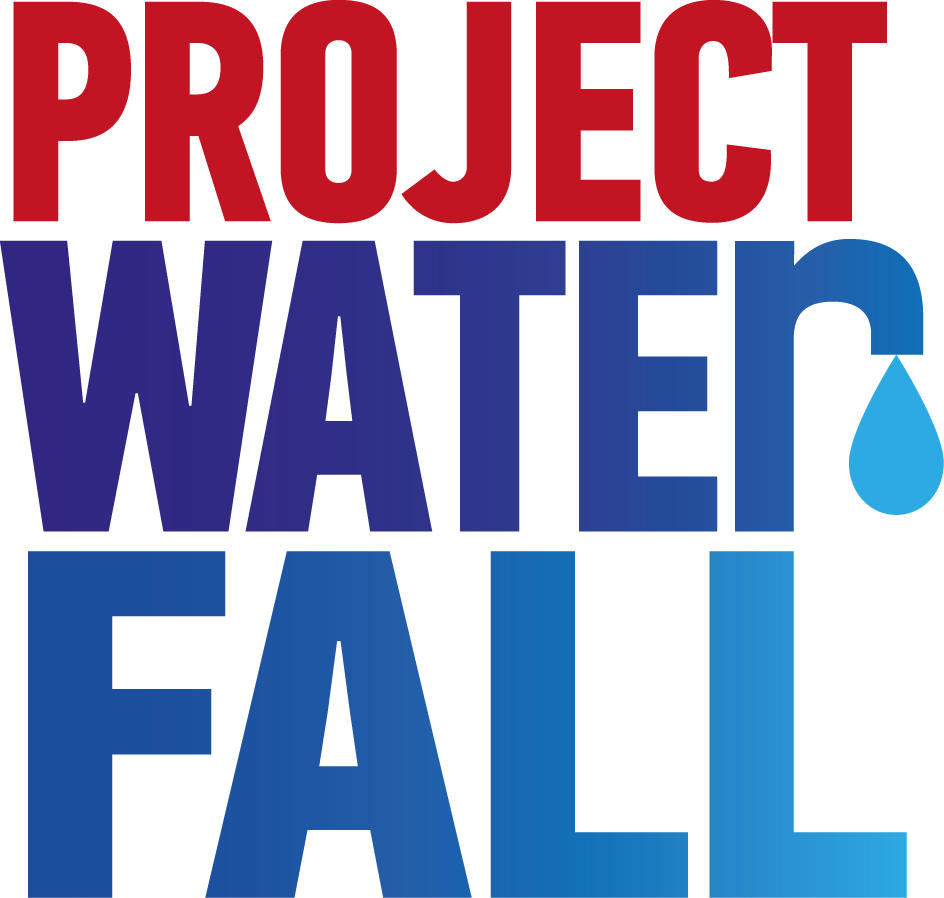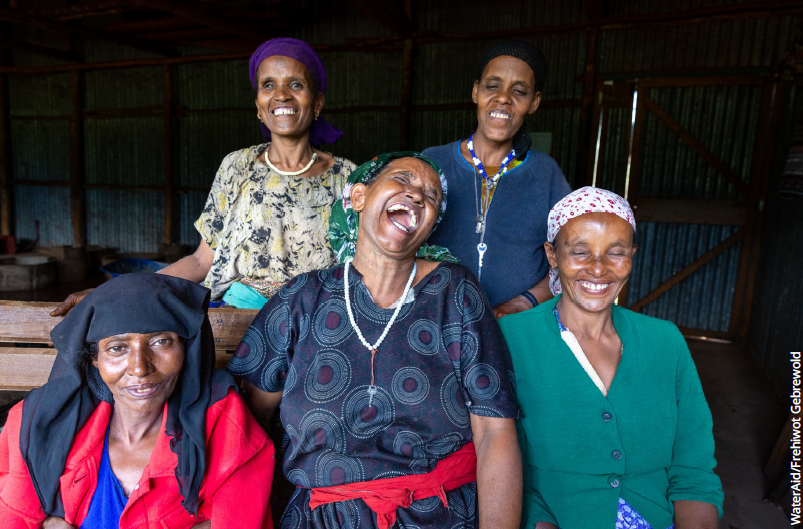Access to clean water and proper sanitation is a cornerstone of health, education, and economic stability, yet many coffee-growing communities still face daily struggles to meet these basic needs. At Project Waterfall, we’re determined to change that, and thanks to your support, we’re making significant progress.
Over 2024 we have achieved many milestones in both our Ethiopian and Rwandan projects alongside our implementing partner WaterAid. In Ethiopia’s Berbere district, our Future on Tap initiative is delivering clean water, promoting hygiene, and empowering women, while laying the groundwork for long-term sustainability. Meanwhile, in Rwanda, our Accelerating Access project is improving water infrastructure and hygiene practices in coffee-farming regions, addressing critical barriers to development.
Left to right - Zinet Mohammed, Lubaba Seid, Makida Kassim, Etewa Yimam, Gardu Adem, members of the stove making enterprise, laugh together, Berbere.
Ethiopia: Future on Tap – Year 2 Milestones
In Ethiopia’s Berbere district, our Future on Tap initiative has been a catalyst for life-changing progress. Over the past year, we’ve expanded access to clean water and improved sanitation practices, empowering communities and building resilience.
Delivering Clean Water
We exceeded our goals by installing 12 community water points—one more than planned—providing reliable access to clean water for 23,000 people. In Harowa Anole kebele, we replaced an outdated diesel-powered system with a solar-powered pumping station, ensuring sustainable and cost-effective water delivery.
For families like Asrat Areda’s in Haro Dumal, the impact is clear, “Now we have a public tap right in front of our compound. We don’t waste our time going to the river anymore. We always have running water through the new taps.”
Improving Hygiene and Sanitation
Good hygiene saves lives, and our campaigns have reached over 13,600 people across five kebeles. Key highlights include:
Training 2,070 parents, teachers, and students in menstrual hygiene management.
Establishing four school WASH clubs to prioritise hygiene education.
Supporting 16 entrepreneurs to produce and sell toilet slabs, promoting better sanitation at home.
Solar panels installed at Haro Anole village. This is the main source of power used to transport water from its source to the reservoirs in Haro Anole’s water supply system.
Empowering Women and Strengthening Communities
Women have been at the heart of our efforts. We trained 30 women to launch green-WASH enterprises, including manufacturing fuel-efficient stoves. These ventures not only provide income but also protect the environment.
Community discussions on gender and social inclusion further amplified the project’s impact, addressing inequalities and fostering collaboration.
Building a Foundation for Sustainability
Infrastructure alone isn’t enough. We’ve equipped 38 water association members and utility staff with skills in financial management, maintenance, and tariff setting to ensure long-term impact. Additionally, a new watershed management plan and data systems are helping local authorities secure water resources for the future.
Gardu, Lubaba and Makida (L-R) working to construct fuel efficient stoves for their enterprise, Gebe Keku, Berbere. Etewa, pictured on previous page, explains more about their stoves:
Rwanda: Accelerating Access – Second Year Success
In Rwanda our Accelerating Access project addresses the critical need for clean water and sanitation in the Mwogo and Juru regions. Despite Rwanda’s reputation for exceptional coffee, farmers often face barriers to water access in these remote, hilly areas.
Clean Water Infrastructure
This year, we completed a major water supply scheme, providing clean water to 35,000 people through 23 new public taps. These taps, directly connected to the new water system, save time and improve health outcomes for countless families.
Promoting Better Hygiene and Sanitation
To complement the water infrastructure, we focused on improving sanitation and hygiene:
Educating 700 people on upgrading and maintaining household toilets.
Engaging 187,188 community members with vital hygiene messages delivered by health workers and village leaders.
Targeting 824 parents with specific guidance on pregnancy and breastfeeding health to improve maternal and child well-being.
Collaboration for Sustainability
Working closely with local government, WASAC, and community partners, we participated in key forums to review progress and address challenges. Field visits to assess public taps led to actionable plans for rehabilitating disused facilities, ensuring continued access for all.
Papias Tujyinama, consultant site manager, inside the pumping station in Mwogo.
The Road Ahead
For both projects our mission is clear: to close the gap between coffee farmers and consumers by making clean water, sanitation, and hygiene a reality for everyone.
In Ethiopia, Year 3 will focus on expanding hygiene campaigns in schools and health centres, scaling menstrual hygiene training, and strengthening WASH governance.
In Rwanda, we’ll continue building partnerships and empowering communities, with a commitment to sustainability and lasting change.
Thank you for all the support over the year. Together, we’re creating a more equitable world and helping bring clean water, sanitation and education to coffee-growing communities across the world.





